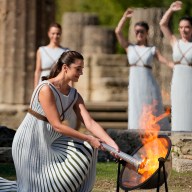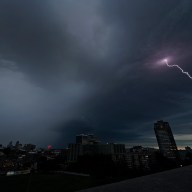 Catch these two through Jan. 19, 2014 (www.nothingtohidenyc.com).
Catch these two through Jan. 19, 2014 (www.nothingtohidenyc.com).
Credit: Michael Lamont/Geffen Playhouse
We spoke with Derek DelGaudio and Helder Guimaraes, the mesmerizing magicians performing “Nothing to Hide,” which is directed by Neil Patrick Harris and playing at Pershing Square Signature Center (480 W. 42nd St.) through Jan. 19, 2014. Spoiler: They wouldn’t tell us how they do their tricks — but you won’t be sorry for that when you see it with your own eyes.
You mention in the show that it sort of came together out of thin air. Tell me how that happened.
Derek: I decided that the world conspired to have us work together, that is what I have decided. I used to think that it was fortuitous, now I think that clearly it was meant to happen because the circumstance were so crazy for what needed to take place, from the moment we met to the moment Helder decided he was going to give up his life in Portugal and move to Los Angeles … and then to managed to agree to work with me in a show where we had no idea what we were going to do. And five days later, we stepped onstage together for the first time. It was pretty remarkable circumstances.
And you knew right away that you worked well together?
Helder: We’ve worked together before, but not onstage together. I’ve helped him in stuff he has done, and he helped me in stuff I have done in the past.
Derek: We talked about ideas that had nothing to do with either of us, just talking in general — “What would be interesting if this existed in the world?” — abstractly.
Helder: We understood we had a good chemistry, I think that’s why we became friends. We had similar interests. We are very different in certain things, and then all of a sudden we go, “Fuck! You have a Bill Hicks painting in your room?” And he goes, “You know Bill Hicks?” And I go, “He’s my favorite comedian!” Things like that.
Derek: And that’s why I say the world conspired for us to work together, because we could’ve thought of it ourselves. We could have thought, “Hey, you and I, we should do a show together.” But it hadn’t dawned on us at all. We just enjoyed each other’s company and work and were friends. But then all of a sudden, in a matter of days, we were forced into a position to work together.
Helder: But it’s not even forced, because it’s not like we had to do it. The first thing was this guy dropped out, and they said, “Hey, do you want to do it?” And the initial idea is we have 40 minutes to do whatever we want, but normally what happens is one ends up doing 20 minutes, and the other one ends up doing 20 minutes. It’s not together. Just fill the space like that. And then we decided, “You know what? You think it would be cool if we could do something together?”
Derek: Close the show together, so that the two worlds collide.
Helder: This was literally in five days. And then we said, “You know what? If we could do something to open the show, like bookends—” And we did the middle one, and then we said, “Now we’re just being lazy.” [Laughs]
Derek: [Laughs] We’re just two away! Come on.
Helder: Think about this: We are doing this for fun, literally for fun. Because we are doing this in the basement of the Magic Castle — you don’t make money — but that’s the secondary part. We’re doing this for fun, we’re not thinking we’ll ever do this again. We’re just like, “We’ll do this for two days.” … The first show we did, everyone left the show, went to the lines that were lining up for the other shows, and said, “No, no, no, you have to see this.”
Derek: They started poaching from other shows to go see ours.
Helder: And so we came out of the first show, and there’s a library at the Magic Castle. The librarian is a really good friend of both of ours — Bill Goodwin — he’s an amazing magician, and he knows everything, especially close-up magic, it’s unbelievable. … Basically Bill comes to us and he goes, “What the fuck are you guys doing? You just did one show; I had eight people coming to the library saying, ‘You have to close the library and go and see the show.’” So we understood right away the impact of what we were doing was more than we were aiming for. … Neil [Patrick Harris, director] saw the show in the first night, he was blown away. He came out of the theater and she was like, “That’s what magic should always be like.” After that weekend, he basically said: You guys have to come back and do this show two weeks in a row.
Was he scouting at the time?
Helder: No. He’s the president of the Academy of Magical Arts. A little background: The Castle, on Oct. 31, caught fire. Part of the Castle was damaged, and part of the Castle was closed. And that night when we did the show for the first time was the reopening of the old Castle. So he was there as the president, and he came to see the show.
Derek: Neil being president is extremely important because … he holds the bar pretty high. He’s the guy who does the Tony’s every year. He knows what entertainment is, and what magic is, and showmanship and art. So when he watched our show … he had no personal interest or investment, it was just: “People should see great magic because it’s great, and this is great magic, so more people should see this.”
What was his involvement as director?
Derek: There’s a person who books the Castle. He told that guy, “Will you book them for two weeks? Good, do that, book them for two weeks,” because he wanted it to be there because he thought it was good.
Helder: After that, all he did for a while was tell friends and people to see [our show].
Derek: And then it turned on him, he backfired, because he had Randall Arney from the Geffen [Playhouse] come. He told him, “You have to come see this show, I think you’ll like it.” … And he was like, “Well, I’ll go see it, I’ve heard other people mention it.” And the second we walked out of the show, he said, “When can you come to the Geffen?” And Neil was standing there, drink in hand, he’s like, “Well I’m glad you two met, my work here is done.” And Randy turns and goes, “Well you’re directing it, right?”
Helder: I don’t remember if it was like that.
Derek: It was very much like that: Neil was very on the spot about it because he had so much going on. … And Neil was already invested enough in terms of the quality of the show; he was around enough that he now wanted to protect the show that he knew existed.
Helder: What I think Neil gets in a really big way, he understands that this is not like, “Oh, we wrote something, and now there are actors doing the show,” he knows that the show is us. We created these things, we placed them in the world, we are the ones doing it. It’s a very personal thing.
Derek: Oddly enough, we’ve had a lot of people say, “I can hear Neil Patrick Harris’ tone in the show,” which is funny to us. It wasn’t that Neil added that, it’s that it existed, which is why Neil was drawn to it.
Helder: I remember a couple of times that he was like, “What if we do it like this?” Because at the end of the day, he’s seeing it from the outside.
Derek: And we trust him.
Helder: And I go, “We can’t.” And he goes, “Why?” And I go, “Because of the magic.” So he never crossed. He knew when we made a point, it’s because the magic will suffer from that.
Derek: He’s super sensitive to the creation.
Why close-up magic, where does it fit into today’s bigger-than-life entertainment landscape?
Helder: I think people forget what being in the same room with other humans is. At the end of the day, I think people spend more time tweeting and calling and Facebooking and things than actually sitting down across from someone and talking. And personally, to be honest with you — since I am a kid, and I started magic when I was 4 — I don’t remember ever liking the stage. I always felt it was fake. I always felt it was very distant. There is kind of a power thing, like they try to show you power. I’ve never been drawn to that. I’m not saying it’s bad, I think it has its place in the world. I think some people love it, and there’s a place for everything. … But I personally always was drawn to the communication part of interacting with the audience: “Pick a card. You are part of the show now.”
Derek: At the end of the day, I want to share an experience with you, not show you something. I think that the most efficient way of doing that with magic is by creating a relationship, and going on a journey with someone.
Helder: You feel like you are literally seeing what I’m doing, and I’m being as fair as I can be. That feeling for me is what all magic should be about, that fairness: “I’m here, I know I’m seeing this — and I know it’s impossible.” I think that can only truly be achieved in a sleight of hand show or a close-up magic show.
Derek: If they see you make a coin vanish in your hands, or a card change, and it’s right in front of your eyes, the tyranny of vision that exists close up is much more powerful than if you’re far away. “I can’t believe my eyes!” is what you want.
New Yorkers especially go through the day with our heads down, being very close to people all the time but in our very narrow bubble, and you guys breach that. You don’t do one-on-one tricks with one person — you do one-on-one tricks with the audience together. Were you worried about this kind of show working on skeptical New Yorkers?
Derek: People are people. I think we’ve traveled enough to see that the audiences have different rhythms and different attitudes, but at the end of the day everyone’s the same all over.
Helder: I think in every crowd there’s skeptics. In every crowd there are a few of them. But you can’t make people see a magic show without trying to figure out how things are done. That’s part of the game. And I’m up for that game, because I think it’s part of my task. … If you believe you are seeing a fairy tale, then what I’m doing is not impressive — because in fairy tales, everything can be true. It’s good that you bring your reality to the show to appreciate what we do.
What about other formats? Do you think the show would work on Broadway or on TV?
Derek: As is, no. We’ve had that opportunity [to change it]; we chose not to. We had people wanting to put us in 1,000-seat theaters: “We’ll just blow it up on IMAX screens, and it should be fine.” … Magic is already inherently about deceiving people. And our job is to be as honest as possible with the lies that we have [in order] to tell the truth about the world. The farther we get from you in distance or whether it be through microphones — we also don’t use mics in our show — or through a television screen of some sort, the further we are from being able to convince you of the truth with the lies that we’re already using. … So we’re very careful. We turned down more money and probably more opportunities. But it’s for the integrity of the show.
Helder: I believe that this show in particular, we can’t do it in a bigger venue. I think every venue has its own limitations and its own possibilities, so if you say, “What if we had to do a show here?” then we would think of a show for that space. And then you can create the same feeling and the same interest. But it’s a different show, it’s a totally different show. It’s not like an adaptation.
Your talent is definitely undeniable, but what takes the show to the next level is your personalities. Do you get that a lot? And feel free to gush about each other.
Derek: With us just talking about magic in a room together, it’s like two kids opening Christmas presents. I think that if that’s the case, and people are believing we’re affable and likeable in the context of the show, it definitely stems from our love of what we’re doing. … Even if we were total pricks offstage, which we probably are, I don’t know, even if that were true, it’s hard to convey that much joy or love for something without just being [infectious].
Helder: For me and for Derek, magic literally changed our lives. If it weren’t for magic, I wouldn’t be here. I couldn’t be here. So that comes across, because I don’t want people to be magicians. If they want, I’m happy to say, “Come to the group.” I’m fine with that. But that’s not what I want. I want them to understand that if they don’t see magic, they are losing something in their lives. Go to the cinema, go to the theater, see a band, experience life. I think that joy of showing them something that they probably thought didn’t exist — I think that comes across from us believing that that’s important and that it can change lives, which it does. So I understand when people say, “I love you guys, you guys are so great,” but at the end of the day, I think it’s because we are in service of this thing that we believe — and that’s what people see: that we’re drawn to showing this amazing thing that exists in the world.
Derek: Magic is still relevant, that’s it.













